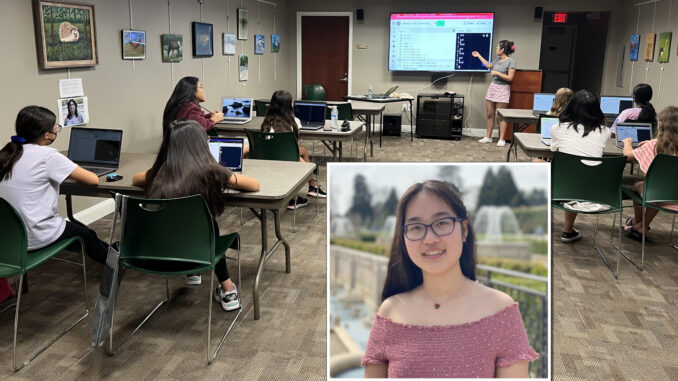
HILLSDALE—Teenager Annie Li is determined to bring balance to STEM classes — by leading them herself at the Hillsdale Library.
That’s via a library update forwarded us by adult programming coordinator Adam Keeble, who notes that although Li saw “a fairly even split between boys and girls in my computer science class at the STEM school I attend (STEM is an acronym for science, technology, engineering, and math) my research showed only 28% of the workforce in STEM is made up of women.”
That’s in contrast, she said, to the population of the United States, which is more than half female.
“At my town high school” — she’s a Bergen County Academies junior studying computer science — “I have been informed that there are only two girls in the entire class,” Li said.
“Women in STEM, or the lack of them, was an issue that hit home,” Li said. “With these classes I hoped to create both access and an environment where girls were surrounded by other girls who were equally excited to learn to code.”
Li, a president at AiGoLearning, a nonprofit for TeensTeachKids, says she has been teaching the programming language Python for approximately two years. “It felt very good to share my expertise. I was finally able to teach in person — so different from doing so online. Everything can be programmed nowadays and having this knowledge offers the world of tech at their fingertips.”
She added that Hillsdale Public Library was a natural choice for her to host her classes. “I was very familiar with the Hillsdale Library and knew that they would be happy to be a platform to offer these. I have always liked the Hillsdale Library, whether it be to pick up some books, or to meet with my Girl Scout troop. “I felt like I had the opportunity to give back to the library by offering the classes there.”
She said, “While I am sure there were some students who were signed up by their parents, the students took some good knowledge away from the course.”
Keeble said Li hosted three classes at the library, which she hopes to return to in connecting with new recruits.
“It felt very good to share my expertise,” she said. “I was finally able to teach in person and I was so happy to have this opportunity. In person, there is more availability for cross-talk and to get to know students better. Helping students with bugs, or problems, in their code is also much easier.”
(Last year we reported on Pascack Pi-oneers FIRST Robotics Team 1676 and its annual Fall for STEAM Fair. Foot traffic was joyously heavy at the event, at Pascack Valley High School in Hillsdale, where the team’s 90 members (from Hills and Valley) had collaborated to set up 30 interactive tables of science, technology, engineering, art, and math activities for special visitors — who had parents and grandparents in tow.)
Python, conceived in the late 1980s, when personal computing arguably was just starting to go mainstream, is one of the most popular programming languages, particularly for programmers just starting out, and was developed to be fun to use. (Indeed, it was named for the surreal British comedy series Monty Python’s Flying Circus.)
Software engineer Tim Peters, in his “The Zen of Python (PEP 20),” gives its philosophy as:
- Beautiful is better than ugly.
- Explicit is better than implicit.
- Simple is better than complex.
- Complex is better than complicated.
- Readability counts.
In an internal interview promoting AiGoLearning, where she started as an intern, Li said she’s had “massive exposure to computer science in the past couple of years and that, in tandem with my desire to teach children, led to my joining AiGoLearning.”
She said, “My experience with AiGoLearning has helped a lot. I now understand the amount of work it takes to hold a whole event, such as a hackathon. Logistics was something I never really considered to be a big task until this.”
She said, “In addition, I believe this gives me a good approximation of how it is like to start your own business or nonprofit. As a teacher, I also believe I understand Python a lot more than when I first learned it myself.”
